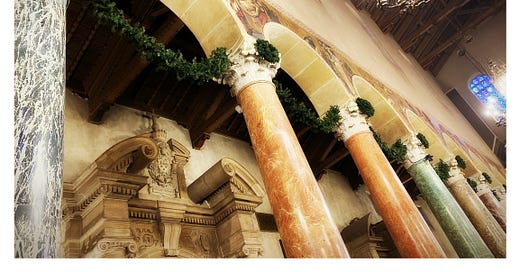This morning, as I was sitting in Pasadena’s historic St. Andrew Church, the city’s treasured Romanesque landmark, I found myself lost (as I often am) in the nearly one-hundred-year-old artwork adorning the interior. From the exquisitely sculpted ornate portals and colonnade of Corinthian-capped marble columns to the murals reminiscent of Italian paintings of the Renaissance…I never tire of its beauty.
Especially at this time of year, with evergreen decorations and twinkling lights, it takes on an added air of wonder and magic…except for…wait a minute, what’s going on here? I was fixated on the unadorned wreaths atop the columns and the garland strung between the giant pillars, trying to figure out what was missing. Something felt off. Then I looked back towards the altar and Baldachin. Hmmm. No trees. No lights.
After a few moments of contemplation, the lightbulb went off. Our very traditional and wise pastor holds the glittering decor until Christmas week. Christmas trees surround the altar, the crèche is installed, and the garlands and wreathes up high sparkle with tiny golden lights like jewelry. From the first of December to Christmas Eve, the transformation is glorious.
Imprudent protraction
I’ve written about my vendetta against the Christmas creep—the decorations and advertising that appear before Halloween—which I believe dilutes the season’s significance, much to our detriment. (I’ll spare you my full upbraiding.) However, sitting in Mass today, this lack of ornamentation struck me at a deeper level than the simplistic dilution of the holiday—no doubt due in part to Father Gonzales’ thought-provoking homily on repentance, redemption, and hope.
Hope. Interestingly, that message, coupled with the unadorned garland, resonated greatly. Protracting the over-the-top Christmas season for nearly two months—as has become customary in the stores and advertising—creates a “ho-hum” attitude. Oh, look, there’s the twelfth, taller-than-the-house inflatable snowman. I compare the experience to being a sponge; there’s only so much we can absorb before it bounces off us. This glut weakens the spirit of the holiday and obliterates the requisite joyful anticipation that engenders hope.
Although much of the anxiety and unhappiness sometimes associated with the season has been attributed to overspending, family tensions, overexertion, etc., I believe this prolonged run-up is an additional culprit that creates a dispiriting fruitlessness. I can remember more than a few Christmases that, although still enjoyable, felt a bit anticlimactic and left me feeling somewhat empty.
Choose small
I believe with a few mindful choices, we can create a truly tranquil and meaningful holiday. I was reflecting on a family up the street from my childhood home who decorated their tree on Christmas Eve, which perplexed me greatly (actually, I was aghast)…until now. I appreciate the great wisdom in that practice. They sidestepped the pitfall of the season’s foremost symbol of joy becoming just another thread in the fabric of their everyday lives.
Similarly, I recently came across an article suggesting adding an ornament to the tree each day, culminating with a fully decorated tree on Christmas Eve, a lovely tradition to slow the roll and bring meaning to each day.
Small practices and subtle mindset shifts make a big difference.
Deliberate choices also give us a sense of control, imparting tremendous well-being and perhaps even boosting longevity. In my March 22 post, Mindful Longevity, I relayed a study by psychologist Dr. Ellen Langer—who has spent 40 years examining the effect of mindfulness on health—that found “simply giving nursing home residents small, mundane choices resulted in longer lives.”
Cultivate simple joys
For the past couple of years, I’ve intentionally chosen not to jump into Christmas too early, which has made a positive difference. I don’t feel exhausted as if I’ve run a marathon by Christmas, and I genuinely appreciate the season’s simple joys, cultivating health and well-being.
The other night, my husband offered me an eggnog—a tempting treat that I very much enjoy—but I said, “No, I’m going to wait until Christmas.” I didn’t feel at all deprived because, just as with the completed decorations in the church, I’ve got something I’m greatly anticipating.
I hope you have many wonderful things to look forward to next week, and I wish you a very calm and Merry Christmas.









